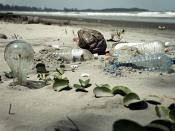The term "waste" is a uniquely human invention. In nature, where everything plays a part in the ecological cycle, waste is a foreign concept. The human perception of waste as useless material to be discarded or forgotten about is contrary to the most basic laws of nature. To make matters worse, methods of solid waste disposal have often had extremely harmful effects on the environment.
Presently, most solid waste is buried in landfill sites. Solid waste disposed in these sites prevent materials from re-entering the ecological cycle, rendering them completely useless. These sites destroy the local environment, and contaminate drinking water. In many urban centers, these high demands force cities to continuously export solid waste to greater and greater distances, increasing energy expenditures and destroying many other environments.
The other conventional solution to solid waste disposal is incineration. This reduces the mass of the waste by 75%, with the remaining 25% usually disposed in landfills.
However, the 25% remaining ash residue retains heavy metals and toxins, now in concentrated forms. Furthermore, the burning of the waste releases enormous amounts of toxic gases into the atmosphere, polluting the air, contributing to the greenhouse effect, and creating acid rain. However, because of the Clean Air Act, incinerators are no longer an option.
Sewage disposal presents another problem. Currently, the primary method of disposal involves separating the water from the sewage, treating the sewage in mechanized treatment plants and disposing it into the nearest large body of water. With moderate population levels, large bodies of water can generally absorb the waste, using many of the present nutrients without harmful effect. However, with the high densities and populations of our modern cities, the dumping of sewage, even treated sewage, has created serious damage to local bodies of water. Inordinate amounts of harmful bacteria...


